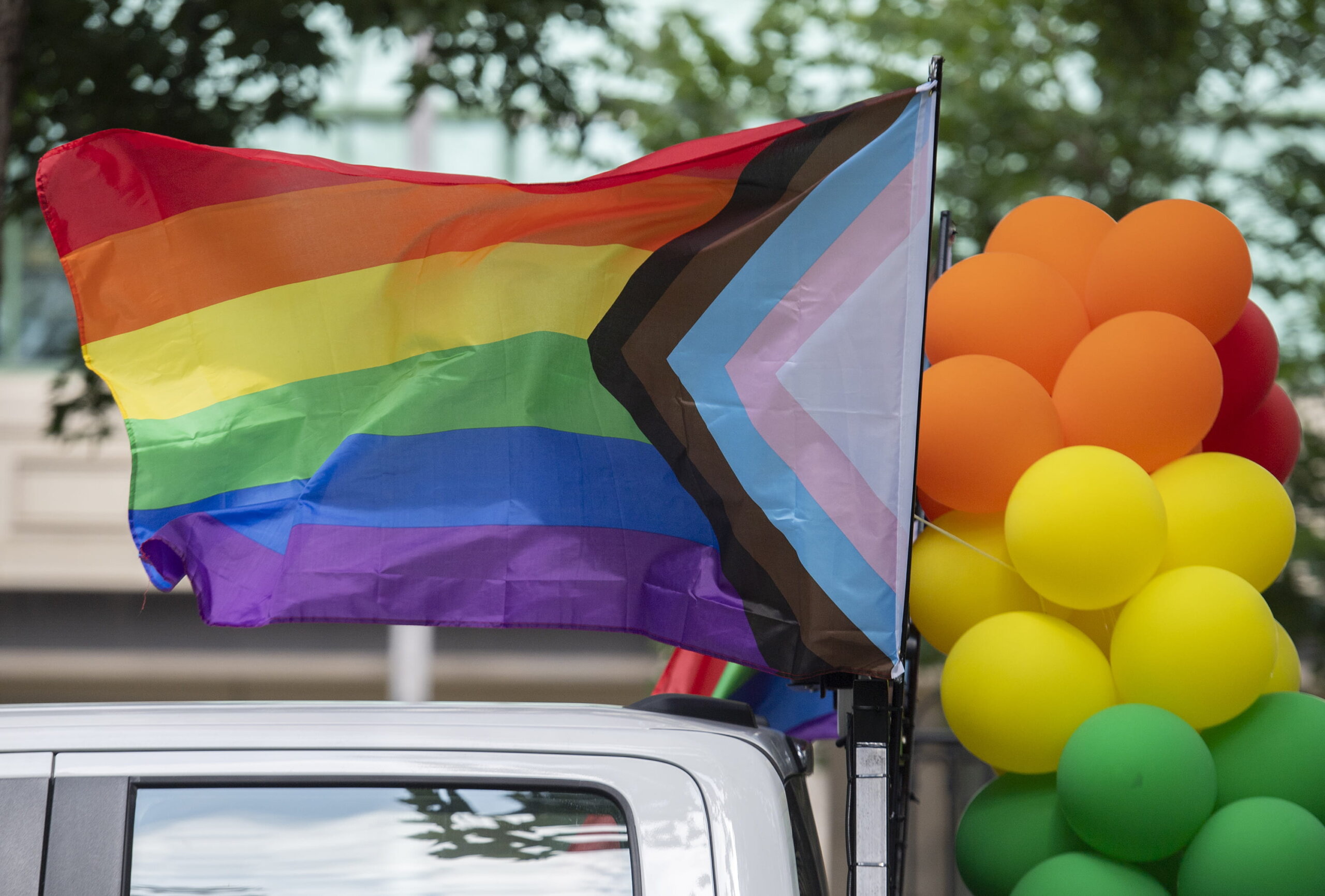It was the breaking news no one expected: Montreal’s 2022 Pride Parade, the first one organized in over two years, was suddenly cancelled just hours before it was scheduled to start on August 7.
Almost everyone in the city found out through news reports and social media—including Montreal’s mayor, Valérie Plante. She quickly took to Twitter to express disappointment in the sudden cancellation and called for an investigation.
That investigation is already underway. Until its findings are released, Fierté Montréal, which organizes the festival, will not comment further on its claim that the reason its event was axed was that the hiring and training of some 100 volunteers to work security was simply not done and that the managing team was not informed of this oversight until the day before.
Lucia Winter, a co-founder of ElleLui, an event production collective that organizes queer, lesbian and sapphic parties, woke up that Sunday morning to the news that the parade was cancelled. They had gone to bed only hours before, after staying up late for ElleLui’s party on Saturday night organized in the context of Pride week.
“I was like, ‘Okay, our party’s over, I can take a break tomorrow, we’ve done our part.’ And then I woke up and it was obviously like fire on social media,” they recount.
Instead of relaxing and enjoying a day of fun organized by other people for once, Winter and Marlyne Désir of the QTBIPOC lesbian/sapphic event production group Sweet Like Honey MTL got to work. They organized a last-minute event in Parc La Fontaine, Pride in the Park, for the community to hang out, listen to music and have a good time.
“We were able to pull together something that 200 people joined in an hour; why weren’t they able to make good on their promise?” says Winter.
While Fierté is not answering these questions right now, the community is still asking them. Many grassroots events organizers are asking whether better collaboration between the organization and the people it’s meant to cater to could have prevented the outcome we saw.
“They could have asked for help,” says Montreal-based queerlesque performer Tristan Ginger, echoing a sentiment shared by many.
Why did Fierté move straight to cancelling the parade after confirming with the Montreal police service that the force couldn’t meet the missing security detail requirement? Until the public knows specifics about the type of training the volunteers needed to work the event, many will be left wondering if the parade could still have gone on had Fierté posted a call for volunteers when it became aware of the situation.
“Going forward, we should consider a more collaborative approach to the development of these festivals between grassroots organizations, festival organizers and local government,” says Sam Miriello, a gay community activist in Montreal who’s been involved in causes from queer sexual health, to student activism, to pandemic mutual aid.
While Miriello wants to cut Fierté some slack, noting that most of the managing team was brought on during the pandemic and had no practical experience organizing the parade, Ginger highlights that this is another blunder from an organization that has already been the subject of criticism in recent years.
Around the time that Toronto Pride was forced into some frank conversations about racism and inclusion, most notably with the peaceful Black Lives Matter protest that held up the parade in 2016, community members in Montreal were also calling out Pride in this city for lack of diversity.
Ginger says they were among those calling on Fierté to carve out a space for BIPOC performers. They say that’s not the only way that Fierté hasn’t prioritized inclusion when booking acts.
“I’ve been performing for 13 years and I’ve never worked with Fierté; I’ve had nothing but problems with them. They seem to want the priority on booking performers who are drag queens … cis women, femme-presenting, queer, anybody outside of the usual cis men doing drag, there’s always been issues.”
Ginger was not contacted to perform in a queerlesque show organized as part of the Fierté Montréal festival, which they believe is due to the fact that they publicly called out the organization in the past.
Fierté was also marred in scandal in 2020 when its founder and chairperson, Éric Pineault, was accused of sexual misconduct. Pineault was suspended indefinitely and the organization’s leadership promised structural changes at the time.
Fierté Montréal also declined a request for comment on these allegations of sexual harassment and lack of diversity and inclusion in the festival.
“I know that they’ve been trying to make changes, but I think that it is primarily targeted toward people who live in the Gay Village, and they don’t prioritize queers,” they say. “(Fierté) is not a space for me, so it’s not on my radar anymore—except for when I saw the Pride Parade was cancelled, because then that was all the talk.”
This year’s festival also marked the first year that some events were moved outside of the Village—once known as the Gay Village, now sporting the name Quartier Inclusif—which has been met with concerns for many that the community is losing a foothold in its own space. Others, like ElleLui cofounder Taylor Douglas, point out that the Village has long been lacking in inclusivity for some groups.
“The Village tends to be a rather specific space, very male-dominated, very white-dominated—so a lot of people don’t have places to go,” she says. That’s why ElleLui came to be. “We just wanted to create spaces that are comfortable, especially because I think a lot of people come to the Village looking for that and when they don’t find it, it’s disappointing.”
The team at ElleLui has contacted Fierté in the past to propose collaborating together, but they did not receive a response.
The head of the Société de développement commercial du Village, which represents businesses in the Quartier Inclusif, Gabrielle Rondy, acknowledged that there are no commercial offerings in the Village right now that cater specifically to trans people, women and/or femme-identifying people. This is one of the issues being looked at to create a more inclusive space. With many events for the festival moved out of the Village, Rondy says the businesses onsite saw their sales take a hit.
Rondy expressed that the SDC, which already works closely with Fierté, also wants a better working relationship.
“We would like better collaboration between Fierté and the SDC. Usually during Pride Week we put our own activities on pause to really hand over the space to Fierté, but this year sometimes their programming was smaller or happening elsewhere, so it brought quiet days to the Village, and had we known, we could have planned things on our end.”
The Sunday the parade was cancelled ended up being a very busy day for these mostly independent businesses, but the abrupt change of plans brought its own stresses as businesses scrambled to accommodate the crowd much earlier than they anticipated.
“When the parade happens, we know what to expect, we know when people start showing up. So it was really the uncertainty, especially after two hard years for the Village,” she says.
The SDC Village is in constant communication with Fierté Montréal year-long to plan the festival. Just like everyone else, the SDC learned of the parade’s cancellation the same way everyone else did.
“Of course we would have helped had they told us,” she says, noting that the SDC could have provided volunteers to help fill the missing positions.
Winter says that while Fierté did have some events on the program for which it partnered with grassroots groups, they believe more effort should be made to highlight community groups and the many initiatives planned in the context of the Fierté festival, but unaffiliated with the organization.
“I think what they should be doing is nod to events that aren’t sponsored by them, but are still happening, because they do have a platform and people who wouldn’t necessarily know to look for other grassroots organizations would look to them to find events,” Winter says.
“As much as Pride is an amazing concept for people to be able to identify with, there are still gaps, and we try to fill those to the best of our ability with the resources that we have.”


 Why you can trust Xtra
Why you can trust Xtra


